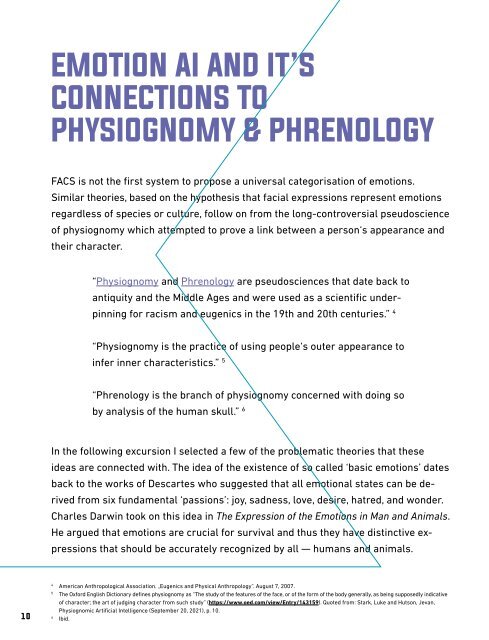K3 MAGAZIN #12
Gloria Höckner (Hamburg/Berlin) ist im K3 Residenzprogramms der Spielzeit 2021/2022. Ausgehend einer transdisziplinären Recherche, der digitale und analoge Praktiken verknüpft, eignet sich Gloria im Rahmen der Residenz Überwachungstechnologien und Systeme an, die durch künstliche Intelligenz menschliche Emotionen erkennen, um alternative Körper, Bilder und Narrationen zu entwickeln. Für die 12. Ausgabe des K3 Magazins erhalten wir einen Einblick in Glorias Recherche.
Gloria Höckner (Hamburg/Berlin) ist im K3 Residenzprogramms der Spielzeit 2021/2022. Ausgehend einer transdisziplinären Recherche, der digitale und analoge Praktiken verknüpft, eignet sich Gloria im Rahmen der Residenz Überwachungstechnologien und Systeme an, die durch künstliche Intelligenz menschliche Emotionen erkennen, um alternative Körper, Bilder und Narrationen zu entwickeln. Für die 12. Ausgabe des K3 Magazins erhalten wir einen Einblick in Glorias Recherche.
Create successful ePaper yourself
Turn your PDF publications into a flip-book with our unique Google optimized e-Paper software.
EMOTION AI AND IT’S<br />
CONNECTIONS TO<br />
PHYSIOGNOMY & PHRENOLOGY<br />
FACS is not the first system to propose a universal categorisation of emotions.<br />
Similar theories, based on the hypothesis that facial expressions represent emotions<br />
regardless of species or culture, follow on from the long-controversial pseudoscience<br />
of physiognomy which attempted to prove a link between a person‘s appearance and<br />
their character.<br />
“Physiognomy and Phrenology are pseudosciences that date back to<br />
antiquity and the Middle Ages and were used as a scientific underpinning<br />
for racism and eugenics in the 19th and 20th centuries.” 4<br />
“Physiognomy is the practice of using people‘s outer appearance to<br />
infer inner characteristics.” 5<br />
“Phrenology is the branch of physiognomy concerned with doing so<br />
by analysis of the human skull.” 6<br />
In the following excursion I selected a few of the problematic theories that these<br />
ideas are connected with. The idea of the existence of so called ‘basic emotions’ dates<br />
back to the works of Descartes who suggested that all emotional states can be derived<br />
from six fundamental ‘passions’: joy, sadness, love, desire, hatred, and wonder.<br />
Charles Darwin took on this idea in The Expression of the Emotions in Man and Animals.<br />
He argued that emotions are crucial for survival and thus they have distinctive expressions<br />
that should be accurately recognized by all — humans and animals.<br />
10<br />
4<br />
American Anthropological Association. „Eugenics and Physical Anthropology“. August 7, 2007.<br />
5<br />
The Oxford English Dictionary defines physiognomy as “The study of the features of the face, or of the form of the body generally, as being supposedly indicative<br />
of character; the art of judging character from such study” (https://www.oed.com/view/Entry/143159). Quoted from: Stark, Luke and Hutson, Jevan,<br />
Physiognomic Artificial Intelligence (September 20, 2021), p. 10.<br />
6<br />
Ibid.


